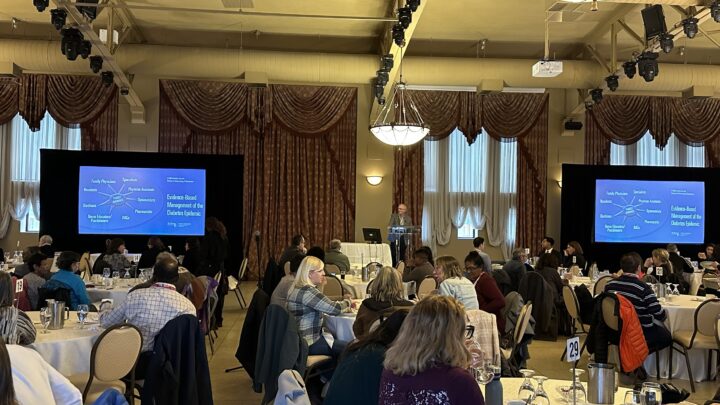McMaster’s annual diabetes conference emphasizes evidence-based management

By Alexander Danne
On November 8, over 800 medical professionals gathered in Hamilton, Ont. at McMaster University’s annual Evidence-Based Management of the Diabetes Epidemic conference to share knowledge on how to combat the disease.
For the past 20 consecutive years, McMaster’s annual diabetes conference has been dedicated to educating both physicians and non-physicians on the latest diabetes treatments. The half-day conference, which is run through the Continuing Professional Development Program (CPD), is offered by McMaster University’s Division of Endocrinology & Metabolism at no cost to the participants because of the Division’s commitment to combat this pervasive disease.
“We’re running the conference during November, the month in which World Diabetes Day (November 14) falls. Our goal is to facilitate the ability of all health care providers to provide evidence-based management to people living with diabetes so that they can maintain or improve health,” says Hertzel C. Gerstein, a professor in the Department of Medicine at McMaster and program chair.
Keynote speaker, Brandy Wicklow is an Associate Professor at the University of Manitoba and the Head of the section of Pediatric Endocrinology in the Department of Pediatrics, Faculty of Health Sciences and is working for over ten years in the field.
“Conferences like these are invaluable in the fight against diabetes. Exchanging treatment ideas that are modeled on cases in the community can really make a difference for our patients,” Wicklow says.
Diabetes is a serious, chronic disease that currently affects at least 10 per cent of adults and over 20 per cent of individuals over the age of 65. Gerstein, who also holds the Population Health Institute Chair in Diabetes Research and Care, at McMaster University, stresses that the prevalence and incidence of diabetes continues to rise.
“This disease places patients at a high risk for numerous serious long-term chronic problems, including blindness, heart attacks, strokes, kidney failure, liver failure, cancer, dementia, and more. In the United States alone, annual expenditures related to diabetes exceed a staggering $300 billion alone,” Gerstein says.
This year’s conference focused on various aspects of diabetes, aiming to:
- Explore and understand various approaches to diabetes care in First Nations.
- Recognize the importance of routine dilated eye exams, and the therapeutic options for diabetes–related eye diseases.
- Develop a framework for managing gestational diabetes and type two diabetes during pregnancy.
- Understand the growing potential for incretin–based therapies in type two diabetes.
- Reflect on different type two diabetes presentations.
- Utilize a growing range of therapies for type two diabetes to optimize outcomes.
In recent years, the conference allowed participants to choose between attending in person or joining online. This year, 650 people joined online, while 200 attended in person. The feedback from participants was overwhelmingly positive.
“I think this conference was great and I learned a lot. Thank you,” one participant said.
“Excellent conference that covered a lot of different topics and helped answer a lot of my questions as a new attending in practice,” another participant said.
“This was another successful conference and we’re looking forward to next year’s event, while we continue the fight against this serious disease,” Gerstein says.
Want to know more?
Diabetes Canada and World Diabetes Day have plenty of information and resources available.
Continuing Professional Development